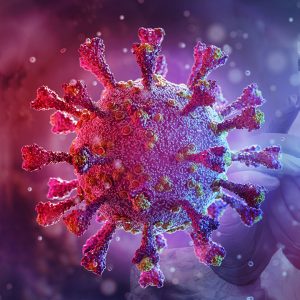What do we know about the different types of corona delta viruses?
A species of coronavirus called the delta species, first identified in India, is evolving rapidly with other versions of the coronavirus around the world.
In mid-February, the number of daily cases in India dropped to less than 10,000 and double-digit deaths. But after two months, the subjects increased, and it finally turned out to be due to a new species called Delta. New strains of the virus have spread to other parts of the world. In the UK, for example, a new species called Alpha grew late last year. But the increase in recent cases in India is much faster than the previous wave of the country, and its speed is much faster than the gradual increase seen in other parts of the world.
According to scientists, India was on the verge of a new wave. Many people refused to wear masks and other precautions, and the government allowed large political gatherings and religious festivals. These gatherings probably became the scene of the above transitional events. Species that are spreading in the population may play a role in exacerbating the disease. According to the Indian Ministry of Health, dual mutant species (Delta), English species (Alpha), Brazilian species (gamma), and South African species (beta) have all been identified in India.

What is Corona Delta?
The Indian corona, now called the delta species, has 13 mutations. But it gets its name (double-conversion) from two mutations similar to mutations seen separately in other species. One of these mutations in other species is associated with an increase in viral infection and is effective in escaping antibodies. In contrast, the other case is like a mutation that can partially run the immune response.
Dr. Rakesh Mishra, director of the CSIR Center for Cellular and Molecular Biology and head of one virus genome sequencing laboratory, says the corona delta was first discovered in India in a sample collected in October. Recent data show that it is expanding rapidly in some parts of India. According to Dr. Anurag Agarwal, director of the Institute of Genomics and Integrated Biology, Bilateral mutations have prevailed in the heavily affected Maharashtra state. According to the National Institute of Virology in Pune, more than 60 percent of the samples collected mutated from January to March.
Across India, 70.4 percent of samples were collected in the week ending March 25, according to the institute’s Covid CG tracking tool. Three weeks ago, the Indian krona accounted for 16.1% of the sample. “When a species dominates in one area, it becomes worrying because it means it can grow in other areas as well,” said Alina Chan, a postdoctoral fellow at the institute. She works in gene therapy and cell engineering.
Doctors and public health experts say many young people are already ill and going to the hospital with severe symptoms. The delta species has spread to more than 80 countries worldwide and is rapidly becoming the dominant version of the virus. In Britain, Delta eliminated the alpha species, first identified in that country (formerly known as the English species), and is the most common virus in the region.
The rapid spread of the delta species has provoked a reaction from health officials. For example, British officials have postponed a plan to reopen the country. In parts of the United States, it is recommended that even vaccinated people continue to wear the mask indoors. The World Health Organization urges everyone to continue the show. Of course, the US Centers for Disease Control and Prevention recommends that people who have been vaccinated be present without a mask in most cases.
In the United States, Delta accounts for about 26.1 percent of cases nationwide, and its prevalence doubles every two weeks. The global concern is even greater. Only 23.4% of the world’s population has received at least one dose of the Covid 19 vaccine, most of whom live in rich countries. Less than one percent of people in low-income countries have been vaccinated.
Symptoms of coronary Delta:
The symptoms of coronary Delta appear to be similar to the main symptoms of Covid species. But doctors found that some people, especially younger people, get sick faster. Studies also show that the delta species reproduce at much higher and much faster levels in the respiratory tract. Vaccinated people are usually asymptomatic or have very mild symptoms if they have Delta. Their symptoms are more like a cold such as fever, cough, headache, and loss of sense of smell. Experts say that if the symptoms are mild, you may confuse your illness with allergies. Important points about the main symptoms of coronary heart disease and coronary delta symptoms are:
- Cough, fever, and shortness of breath are common symptoms of Covid.
- Sinus congestion, runny nose, and sore throat are symptoms of delta infection.
- Excessive sneezing is a sign of Delta.
Covid delta species 19 may have milder symptoms and are not usually associated with the virus; Some people may confuse it with an allergy or other common illness.
Louisiana Health Officer Joe Canter says the Covid Delta 19 species still have a common cough, fever, and shortness of breath. But he sees many patients with sinus congestion, runny nose, and sore throat, which seem to be related to common diseases. These symptoms can also be a sign of delta infection. “You may have relatively mild symptoms that you can easily confuse with allergies and other common illnesses,” says Kanter.
Experts recommend that if you have symptoms, albeit mild, even if you only have a sore throat or runny nose, or sinus congestion, limit your contact with others until you feel better. Excessive sneezing has also been reported as a sign of Delta. Researchers say that those who have been vaccinated and then tested positive for Covid 19 are more likely to report sneezing as a sign of illness than those who have not been vaccinated. In addition, according to some experts, fabric masks may not be as effective in protecting against delta species as KN95 or N95 masks.
Delta corona is more contagious:
Alpha species are almost 50 percent more contagious than previous versions of the virus, but Delta appears more virulent. Data from the UK Public Health Agency show Delta’s transmission capacity maybe 60% higher than Alpha’s. Ravina Kular, an epidemiologist at the University of California, Berkeley, described the delta species as “very worrying” and said people unaware of their delta infection were more likely to spread the virus to others and up to eight others. According to the US Centers for Disease Control and Prevention, Corona delta is contagious to chickenpox and has an initial transmission rate (R0) of 5 to 9.
Corona Delta can escape parts of the immune system:
The only concern is that the Delta is not transmitted to other people. “Delta had the benefits of alpha transmission and, in addition, it could escape parts of the immune system that are more beneficial than alpha,” said Ravindra Gupta, a virologist at the University of Cambridge.
Researchers have shown that antibodies from people who have recovered from Covid and vaccinated people have less power to prevent delta cell infection. When they analyzed a group of Covid 19 cases in health care workers who received the Astraznka vaccine at a hospital in India in April, they found that most had Delta. A similar situation was observed in two other health centers in Delhi, indicating that Delta is likely to infect some vaccinated individuals more than species such as Alpha.
Of course, in general, it seems that vaccines are still effective, and vaccination now continues to protect people against the worst cases of Covid. Based on preliminary studies, the Covid 19 vaccine appears to be less effective against Delta. But two doses of the vaccine work better than one dose. Researchers at medRxiv.org reported on May 24 that a dose of the Pfizer or AstraZeneca vaccine was about 33 percent effective in preventing delta symptoms. However, the effect of these vaccines was against alpha 55. However, with the second dose of Pfizer vaccine, the efficacy against Delta was about 88 and against alpha 93.4. The double dose of the AstraZeneca vaccine was effective at about 60 against Delta and 66 against Alpha.
In another experimental study, researchers reported on June 21 that the vaccine was more effective in preventing hospitalization. A dose of 19 Pfizer Covid 94 in the vaccine effectively prevented the admission of patients with Delta, and the amount of Astrazeneca 71 was effective. The second dose of the vaccine was increased to 96 92 and 92, respectively. In areas with high vaccination rates, such as the United Kingdom, an increase in Covid 19 cases has not yet been associated with a significant increase in hospitalization or mortality. But hospitalization and death are usually two weeks later than usual. So time shows whether these numbers increase or not.
There is not much information about Delta and the effectiveness of vaccines like Johnson. But according to a preliminary study published July 1 on medRxiv.org, they detected antibodies produced in response to the delta vaccine. Therefore, the vaccine should still be effective. The more people are vaccinated, the less Delta will cause problems in the community. But vaccines do not protect everyone equally, and relatively healthy vaccinated young people are unlikely to have problems. But according to Gupta, we see hospitalization and death in the vaccinated elderly and those who have major issues.
Not everyone has the same level of protection as a result of receiving the vaccine. In addition, children under the age of 12 are not yet eligible for the vaccine. Many people still have weak immune systems, such as transplant recipients, cancer patients, or the elderly, who may be at risk. Many of these people have been vaccinated and have done their best to use those around them to protect themselves.
Corona Delta in children:
As mentioned, Delta is more contagious than previous strains of the coronavirus. We do not currently have accurate data to show the severity of coronary delta symptoms in children. Recently, the prevalence of Covid 19 among children in the United States has been steadily increasing. Of course, the signs were milder: cough, sneezing, runny nose, upset stomach, headache, and fatigue. Recent stress has not yet caused severe illness. But some pediatric hospitals have reported an increase in Delta-type hospitalizations.
In general, children with covid 19 will have very mild symptoms. It is rare for a child to become seriously ill with any cavity. However, according to an internal document from the US Centers for Disease Control and Prevention, delta species may cause more severe illness than previous species. But this has not been conclusively proven, and some infectious disease experts say there is currently no convincing evidence to support it.
Delta coronavirus will not be the last type of coronavirus:
Delta will probably not be the last species to appear on Earth. Vaccines still protect people. But with the spread of the virus among unvaccinated people, their effectiveness may seem to diminish. “With the release of the coronavirus, new species are emerging. This is what viruses do,” Tedros Adhanom Ghebreyesus, director-general of the World Health Organization, told a news conference on June 25. Species prevent transmission. “It seems, and the less transmission, the less likely it is that new species will emerge.”


